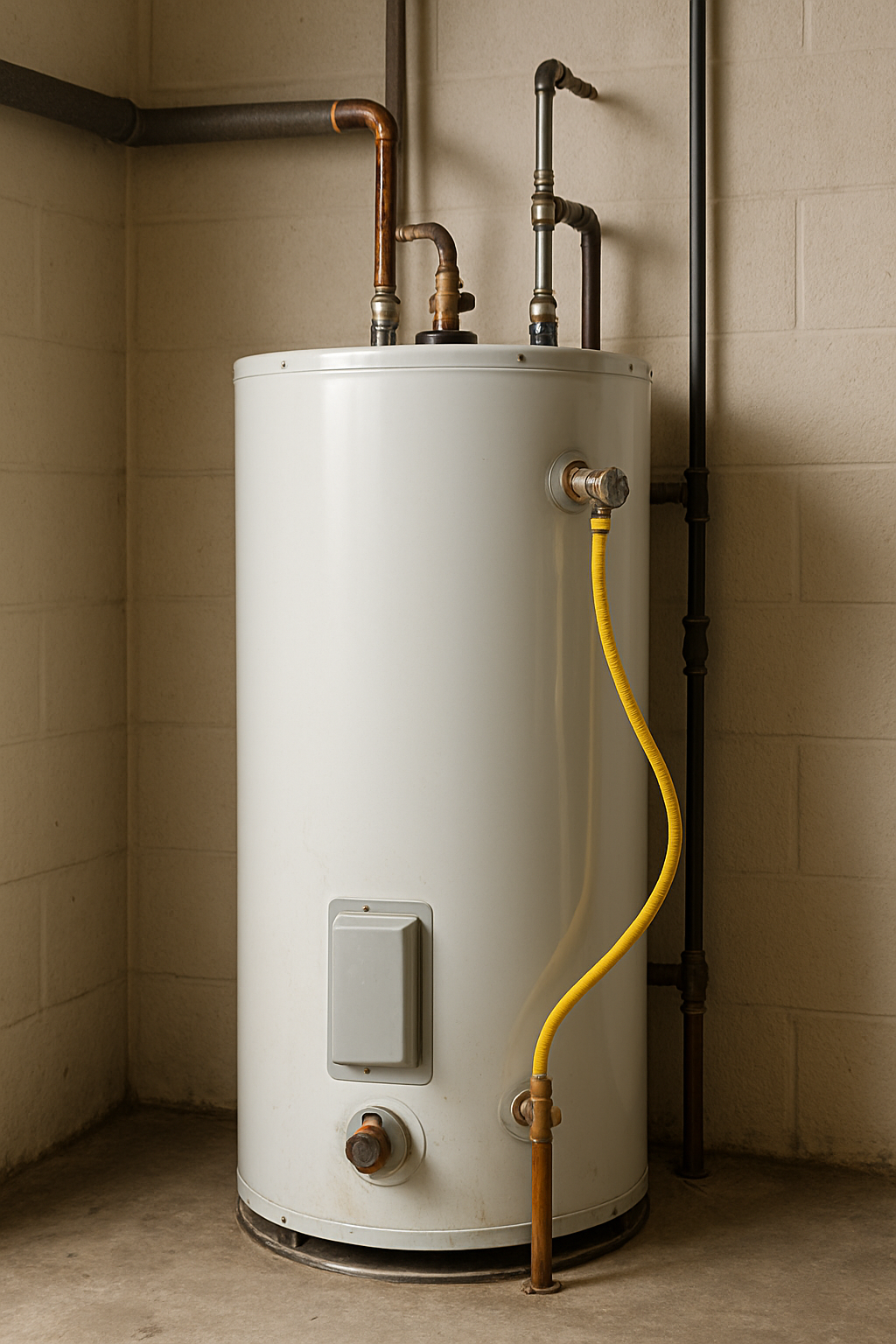Table of Contents
- 1 Thinking About Water Heaters Beyond Hot Showers
- 2 What Influences Water Heater Efficiency?
- 3 Easy Maintenance Tasks for Homeowners
- 4 Simple Upgrades Worth Considering
- 5 Comparing Tank, Tankless, and Heat Pump Models
- 6 Temperature Setting & Safety Tips
- 7 When to Seek Professional Help
- 8 Energy-Saving Habits to Adopt at Home
- 9 Conclusion and Further Resources
Thinking About Water Heaters Beyond Hot Showers
Water heaters often work behind the scenes, quietly powering many aspects of daily life. Despite being tucked away in basements or closets, they’re essential for everything from comfortable showers to sanitary dishwashing and laundry. Many households don’t realize how much water heating can impact monthly budgets. According to the U.S. Department of Energy, water heating can account for as much as 18% of a typical home’s energy bill, making it one of the most significant residential energy expenses. Many families could reduce these costs through conscious habits, timely maintenance, or by turning to services like water heater installation near me when their system is beyond repair. Being proactive about water heater care isn’t just about avoiding cold showers—it means ensuring your home is comfortable and cost-effective.
As utility costs continue to rise, reevaluating water heater use and efficiency can significantly reduce energy bills. Households that pay more attention to how often and in what ways they use hot water generally see real savings. And those savings add up all year, not just during higher usage in winter.

What Influences Water Heater Efficiency?
Several factors converge to determine the efficiency of your home’s water heater. The age of the unit is one of the most significant indicators. Older models tend to lose heat more rapidly and typically harbor sediment that lowers capacity and requires the unit to work overtime. The water heater’s type—whether tank, tankless, or heat pump—also significantly affects how much energy is required to deliver hot water on demand. Proper sizing for household needs, seasonal use, and insulation all influence performance.
According to the U.S. Department of Energy’s water heating guide, even small inefficiencies increase over time. For instance, inefficient habits such as taking long, hot showers daily or running half-full dishwashers can squander energy and water. Understanding these influencing factors is crucial in reducing unnecessary costs and maximizing comfort.
Easy Maintenance Tasks for Homeowners
- Flush the tank yearly: Sediment naturally forms in tanks and can harden, causing strange sounds, inefficient heating, and even tank failure. Draining a few gallons once a year flushes away this buildup, keeping heating elements and the interior of the tank in better shape.
- Check the anode rod: This critical component prevents rust from entering your tank. It needs replacing if it’s heavily corroded—ideally every two to three years, but sometimes sooner in homes with hard water.
- Inspect for leaks, rust, and corrosion: Small leaks or spots of rust can quickly grow into major problems. Addressing these promptly can save hundreds or thousands in repair costs.
- Test the temperature and pressure relief (TPR) valve: This safety feature should be tested at least once a year. Simply lifting and releasing the lever should allow some water to escape—if not, or if it won’t snap back, replace the valve.
Regular attention to these maintenance tasks keeps your water heater at peak performance and can help prevent common causes of breakdowns. For detailed instructions on staying ahead of problems, the Consumer Reports water heater maintenance guide is an excellent resource filled with step-by-step advice.
Simple Upgrades Worth Considering
You don’t need to invest thousands in new equipment to see meaningful improvements. Wrapping older tank-style water heaters in insulating jackets can prevent standby heat loss. Likewise, insulating both the hot and cold pipes coming into the unit helps keep water hot for longer as it moves through your home. Adding low-flow showerheads and faucet aerators reduces the amount of hot water used per minute, often with surprisingly little impact on comfort. Adjusting your thermostat°F, instead of the factory-set 140°F, improves safety and can reduce energy use by four percent or more for every 10-degree drop.
Studies consistently show that implementing these measures, especially insulation and lower temperature settings, can yield an immediate and noticeable decline in energy consumption—some families save up to $30–50 a year just by insulating and lowering settings.
Comparing Tank, Tankless, and Heat Pump Models
Knowing the differences between available models is crucial when choosing or upgrading a water heater. Conventional tank water heaters are cost-effective to install and suit various needs, but operate by keeping a large volume of water hot all day, which leads to greater energy use during idle times. On the other hand, tankless models heat water instantly, offering efficiency, a longer lifespan, and virtually endless hot water for households with consistent usage. However, they can run out if there’s a high, simultaneous demand.
Heat pump water heaters represent a newer, greener choice. These units use heat from the air or ground to warm water, making them up to three times more energy-efficient than standard electric models. The U.S. Department of Energy notes that these can slash water heating expenses by up to 60%, depending on climate and installation. Although the initial setup is more involved, long-term operational savings are considerable. The best choice depends on your household’s size, water consumption patterns, and regional energy costs.
Temperature Setting & Safety Tips
- For most households, stick with 120°F. This temperature setting is hot enough to prevent bacteria while being safe enough to reduce the risk of accidental scalding. Lower temperatures also reduce mineral buildup, which shortens the lifespan of heating elements.
- Install anti-scald devices: These inexpensive gadgets, especially important in homes with small children or aging adults, can be placed on faucets and showers for an added layer of burn protection.
- Test your tap water temperature regularly: Use a standard kitchen thermometer to ensure water isn’t coming out hotter than expected, especially after system adjustments or maintenance.
Managing hot water safety is about protecting your family and lowering energy bills. These adjustments are simple but deliver real peace of mind.
When to Seek Professional Help
While maintenance can handle most minor issues, specific problems should be entrusted to licensed professionals. If you hear banging, popping, or high-pitched noises coming from your tank, or notice your water is rusty or foul-smelling, it’s time to call in help. Visible leaks, unexplained spikes in energy bills, or a total loss of hot water are also red flags that shouldn’t be ignored. Yearly professional inspections catch issues early, provide deeper cleaning, and honor warranties. Most importantly, skilled technicians are equipped to safely handle gas and electrical components, which can prevent emergencies and bigger expenses in the future.
Energy-Saving Habits to Adopt at Home
- Take shorter showers: Even reducing each shower by one minute can save a typical household hundreds of gallons and considerable energy over a year.
- Use cold water for laundry when possible. Most detergents work well at low temperatures, keeping both your clothing and your water heater in better shape.
- Wait for full loads in dishwashers and washing machines: These appliances use nearly the same energy and water per cycle, so filling them up every time is inefficient.
- Don’t leave taps running: Turning off the hot water while brushing teeth, soaping up, or scrubbing dishes quickly adds to meaningful savings.
Building these habits into your daily routine is one of the simplest—and most effective—ways to keep bills low and your hot water system running efficiently.
Conclusion and Further Resources
Water heater efficiency and home comfort go hand in hand. Whether the benefits extend far beyond lower bills, diligent maintenance, minor upgrades, or informed product choices, the benefit of efficiency means using energy more responsibly, enhancing daily convenience, and extending the lifespan of one of your home’s unsung heroes. With guidance from trusted sources, anyone can control their water heating systems more effectively. And for those looking for reliable solutions or upgrades, searching for water heater installation near me brings dependable options right to your doorstep.

